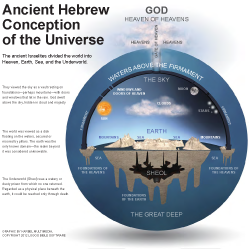82:title–8 Psalm 82 is unusual in that God serves as the main speaker. It sets the scene with God taking His place in the divine council (v. 1). God then speaks and rebukes the gods as He commands them to act justly toward the weak and needy (vv. 2–4). The psalmist continues by describing the gods as ignorant (v. 5) before God again speaks and condemns them to die like men (vv. 6–7). The psalmist concludes by petitioning God to judge the earth (v. 8). |
82:title A psalm See note on 4:title.
of Asaph See note on 73:title.
82:1 stands The Hebrew word used here, nitsav, is a singular verbal form, which means that its subject, which is elohim in Hebrew—and could be translated as “God” or “gods”—should be translated in the singular as “God.” The imagery that extends from this verb is one of presiding, since the setting is a formal council meeting.
the divine assembly A descriptive phrase used of the heavenly host. Like other ancient Near Eastern cultures, the psalmist conceived of God as directing the affairs of the unseen world through an administration of divine beings. The members of the heavenly host are often referred to as a “council” or “assembly” (see 1 Kgs 22:19–23).
in the midst of the gods The Hebrew preposition used here, qerev, requires the Hebrew word elohim to be translated as a plural here—as “gods.” The gods in the verse are the council members, the heavenly host (see Psa 82:6). A council of divine beings is also mentioned in 89:5–7, where they are depicted as in heaven or the skies.
82:2 How long The affairs of the nations of the world are supposed to be judged according to divine law and justice; furthermore, the spiritual authorities involved in the affairs of the nations (the gods; see note on v. 1) must observe divine law and justice. However, the divine beings God addresses have perverted justice (see Deut 32:8–9; note on Ps 32:8).
show favoritism to the wicked The gods (elohim in Hebrew) have failed in their administrative duties involving humanity; they are corrupt and will be judged (compare note on v. 1). In this psalm, they are on trial before God, who is their judge—He is speaking to them.
 Deuteronomy 32:8 and the Sons of God
Deuteronomy 32:8 and the Sons of God
82:3–4 The four nouns used in the Hebrew text of Psa 82:3–4 commonly occur in the ot to refer to the socially marginalized. The language the psalmist uses emphasizes the need for the wicked (who could be rich or poor) to be prevented from mistreating the lower social classes. The lowest classes—which were commonly neglected in ancient Near Eastern cultures—were to be protected. The divine order God commands would remedy this situation. |
82:4 deliver them from the hand of the wicked In God’s ultimatum to the corrupt gods (elohim in Hebrew; see note on v. 1), God calls for the wicked to be stripped of power and for true justice to be restored. He declares that the weak and dispossessed must be freed from the oppression of the wicked.
82:5 They go about in the darkness The psalmist describes the elohim as inept and corrupt. They are unable and unwilling to fulfill their office and duties.
the foundations of the earth The Hebrew phrase used here, mosde erets, reflects ancient Near Eastern (and Israelite) cosmology. The ancient Israelites believed the world rested on pillars or a foundation.
are shaken The psalmist describes the failure of the gods (elohim in Hebrew) as having cosmic consequences. The very foundations of the created order are shaken when the heavenly realm endures corruption and evil. Only God’s intervention and judgment can remedy the situation.
82:6 You are gods The term elohim is plural (see note on v. 1).
sons of the Most High The Hebrew phrase used here is a synonym for the more common Hebrew phrase bene elohim (usually translated “sons of God”). It denotes divine beings (see Gen 6:2, 4; Job 1:6; 2:1; 38:7; Deut 32:8).
all of you A plural pronoun is used here in Hebrew.
82:7 However, you will die like men Although the gods (elohim in Hebrew) are not people, they will die like people do (compare note on Psa 82:1).
you will fall The word naphal is used elsewhere to describe death (e.g., 1 Sam 4:10; 18:25).
like one of the princes The psalmist indicates that these divine figures will die just as human authorities and rulers will.
82:8 Rise up, O God The singular Hebrew imperative used here, qumah, indicates that the Hebrew word elohim is singular here and should be translated as “God” (compare note on Ps 82:1). The psalmist calls on God to rise up and judge the whole earth, reclaiming the nations He disinherited and allowed to come under the jurisdiction of other gods at Babel (see note on Deut 32:8; note on Ps 32:9). Some of the earliest poetry in the ot presents the idea of Yahweh’s global kingly reign (see 29:10; Exod 15:18; compare Deut 2:9, 19).

|
About Faithlife Study BibleFaithlife Study Bible (FSB) is your guide to the ancient world of the Old and New Testaments, with study notes and articles that draw from a wide range of academic research. FSB helps you learn how to think about interpretation methods and issues so that you can gain a deeper understanding of the text. |
| Copyright |
Copyright 2012 Logos Bible Software. |
| Support Info | fsb |
 Loading…
Loading…

